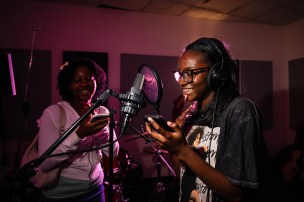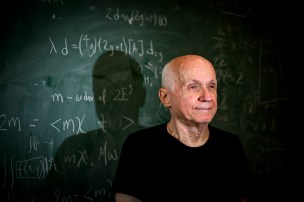Published on
This Northeastern graduate started a comedy podcast. It changed her science career
After graduating in 2014, Emily Costa pursued a Ph.D. studying lung cancer. “Facts Machine,” combining trivia with a live show, inspired a new focus — making science accessible to broad audiences.
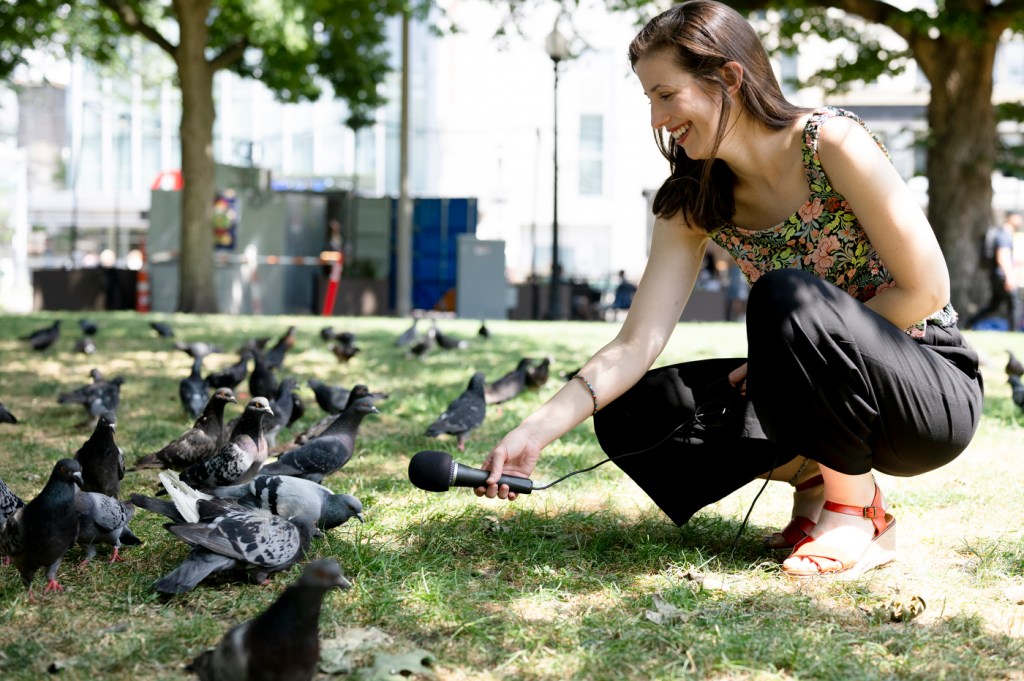
One April evening in Manhattan, Emily Costa asks a deep (pun intended) question: Do sea sponges have nervous systems?
Her two guests onstage at Caveat, a cabaret theater in the Lower East Side, are reasonably well-equipped to answer. Both Devon Collins and Chloe Lopez-Lee have Ph.D.s in neuroscience. So does Noah Guiberson, one of Costa’s co-hosts on “Facts Machine,” a podcast and monthly live show that combines comedy, trivia and scientific deep dives organized around a new topic each episode. This evening, the subject is “Piece of Mind,” the program all about brains.
Still, the scientists hesitate before guessing. Yes, they decide; sea sponges have nervous systems.
They’re wrong, Costa tells the crowd. The 2014 Northeastern University graduate then launches into a semi-scripted mini lesson about sea sponges, “the unbothered queens of the sea.”
“Sea sponges are soaking up everything but knowledge,” she quips. “And we think that’s by evolution. A study of all the different kinds of cells in sea sponges identified one that was like neurons, but it’s in the gut. This links back to a theory that sea sponges lost their nervous systems … These cells might be related to the nervous system they once had. Authors also posed this idea to the sea sponges, but as far as we know, they’re still digesting…”
She cracks at her own joke. The trivia round also includes questions about organisms with 32 brains (leeches), and what happens to songbirds’ brains during mating season (they grow bigger).
Earlier in the show, guests Collins and Lopez-Lee shared tidbits related to their respective areas of neuroscience expertise. Lopez-Lee, whose focus is on gender differences in neurological disorders, told a madcap personal story about the unintended consequences of convincing her boyfriend to treat his ADHD.
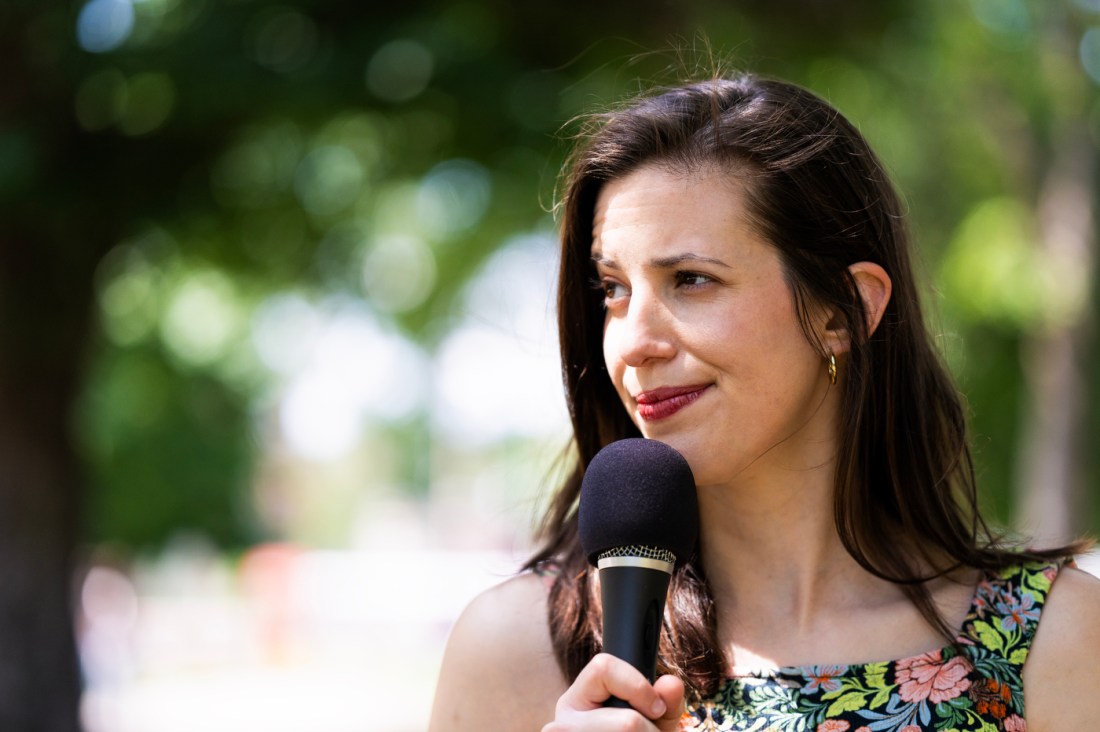
Collins’ “set” comprised brief historical anecdotes about people whose personalities changed after injuries or surgeries — in 1845, for instance, Phineas Gage survived a railroad spike going through his head, losing all social inhibitions as a result.
Launched in 2018 by Costa, Guiberson and Rob Frawley, “Facts Machine” is more than an excuse for members of New York’s scientific community to crack nerdy jokes about their areas of expertise, though it is that. More importantly, the show offers its guests a rare forum to talk about their research fields in a raucous, non-academic setting — complete with a house band, the (all-scientist) Trunk Pumpkins.
“We love bringing on students and folks who are interested in talking about science to a public audience in a way that’s different from what they’re used to in their Ph.D. programs,” Costa says. “They get that opportunity onstage to show the world how awesome they are.”
Costa was well into her own graduate program before realizing that she, too, wanted to talk about science in a different way. After graduating from Northeastern with a biology degree, Costa worked in Boston’s biotech industry before entering a Ph.D. program in New York, where she studied rare cancers that affect the lungs. She earned her doctorate this past spring. By then, her career goals had changed.
Costa’s professional aims are now dedicated to science communication and outreach, working with organizations dedicated to making the scientific process more broadly accessible. During her graduate studies, she volunteered with nonprofits including BioBus — which connects scientists and a bus tricked out with lab equipment to underserved communities — and RockEdu, a science outreach program. Now, as a civic science associate for the civic science fellows program at the Rita Allen Foundation, a biomedical nonprofit, she is helping build curriculum on how to maximize the impact of such initiatives.
“‘Facts Machine’ taught me that I’m interested in science communication,” she says. Through the show, and the professional and social connections she formed as a result, “it felt like a route appeared to me where I could synthesize the love of science and the love of writing that I always had growing up. Like oh, I can actually put these together.”
‘I learned a lot about birds’
Costa’s Ph.D. training is not rare in the “Facts Machine” universe. But according to her co-hosts, “Em,” as everyone calls her, adds something else to the show: a way with words and a devastating sense of humor. “She’s such a good writer,” says Guiberson. “She’s great at delivering stuff that seems like it would only make sense if you were reading it, but making it conversational.”
His co-host, he recalls, gave a barn burner of a toast at his wedding in May, weaving together funny personal memories with an overarching metaphor about the mating habits of doves.
“I learned a lot more about birds than I expected to,” he laughs.
Science and writing have been Costa’s two driving interests since her childhood in Western Massachusetts. Her family members were capable amateur botanists, and she devoured stacks and stacks of National Geographic books on everything from the human body to how airplanes work. In high school, she was most interested in human biology; by the time she enrolled at Northeastern, she was sure she would become a doctor.
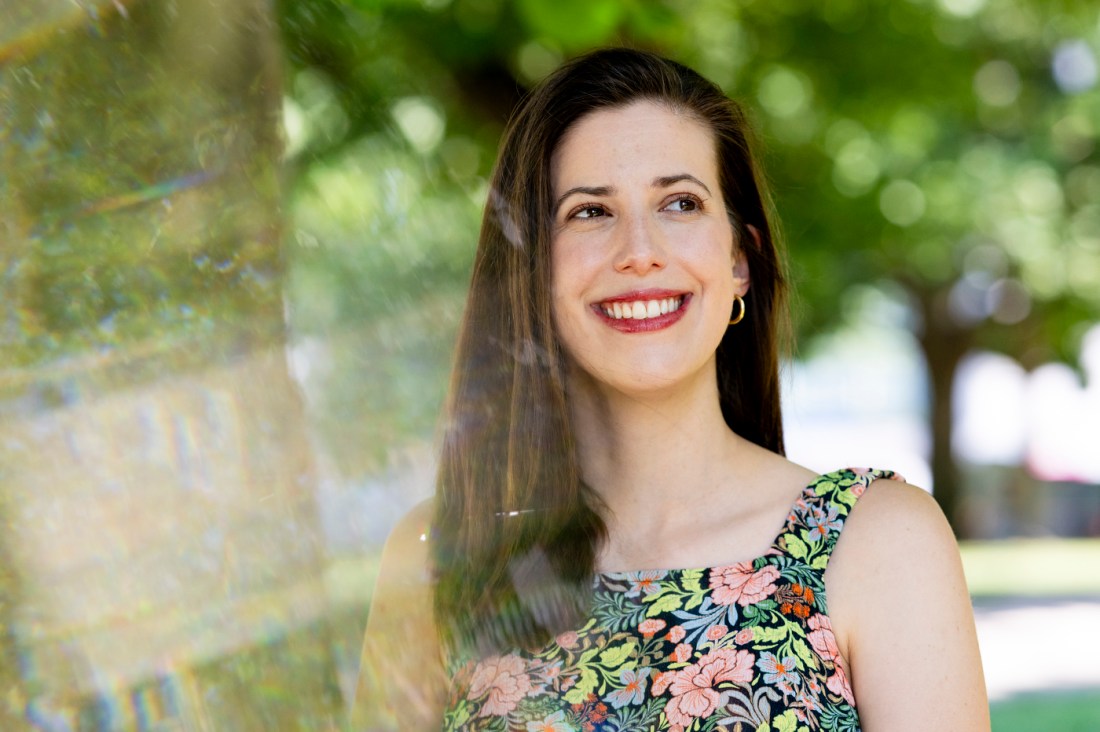
But her classes on the Boston campus were a revelation. “Northeastern was the first place I got any exposure to what research science looks like,” she says.
She took an endocrinology course with professor emeritus Wendy Smith that revealed the fascinating biological workings of the human body on a molecular level. After completing co-ops at MIT’s Broad Institute and Genzyme, a biotech company, she took a job in an oncology lab at the drug company Novartis upon graduation.
Notorious IgGs
“Facts Machine” came about gradually. During her first year of graduate school at Weill Cornell in New York, Costa became a regular at a weekly trivia night at The Allie Way, a bar on campus. Guiberson and Frawley hosted.
“Her team was definitely one of the teams that were the most into it,” Guiberson says. “They had some very punny science name I can’t remember.”
“The Notorious IgGs,” Costa says. (This is a joke about immunoglobulin, a blood antibody.)
One week they were short a host, and Costa stepped up. “I’d had … not an excessive number of beers, but enough to feel a little brave,” she recalls.
She became a regular host. During their stint hosting bar trivia, Costa, Guiberson and Frawley “were finding that we were much more interested in the long, interesting, often funny stories behind the questions we were asking,” Guiberson says. “The questions became an excuse to get to the stories.”
Featured Posts
A format for “Facts Machine,” slowly evolved: Expert guests would come on to tell such a story, then compete in an on-theme round of trivia. Their first guest was Rich Fisler, a high school chemistry and physics teacher and the father of one of Costa’s closest friends at Northeastern. During his episode, Fisler went deep on the Periodic Table (and made some bawdy jokes that can’t be printed here).
Their tagline for “Facts Machine” is “for people who are curious about everything — but especially the things that make them laugh,” Guiberson says. Topics cover a wide base; there are episodes on everything from symbiotic organisms to teeth and the Olympics. Right now, the show runs monthly; every episode is recorded live at Caveat.
Data for the people
As Costa’s career ambitions to get a broader swath of the public involved and interested in science have taken shape, “Facts Machine” has offered not just inspiration, but an effective tool for doing so.
“I met Em through ‘Facts Machine,’” says Jeanne Garbarino, who recruited Costa for her position at Rita Allen. During the COVID-19 pandemic, the podcast’s hosts held a series of Zoom trivia nights for Rockefeller University’s science outreach arm, which then transitioned into live events when the pandemic ebbed. Costa also produced a season of “Data for the People,” a web series that presents high-concept research topics to the broader public, including “Social Behavior” and “Humans and Medicine.”
“She has a really good understanding of the science landscape beyond academia in terms of justice equity,” Garbarino says, “ [she’s] looking for the systemic change we need to see in our science spaces to make sure that more people can be involved.”
Costa also serves as an organizer for ComSciCon, a workshop aimed at helping research graduate students talk and write about their work, with panels run by scientists as well as communications professionals like journalists.
It’s a wide array of experiences, and one Costa is still trying to parse for the future. “With each little funky twist and turn my career has taken, I’ve gotten closer and closer to where my passion really is,” she says. “This year I’m hoping to figure out where exactly I want to situate myself.”
Meanwhile, a small “Facts Machine” tour is tentatively in the works for 2025. “I think we’ve arrived at a model for it that works really well and I’ve loved being able to just get to know folks in the broader community,” she says. “I’m excited to keep doing what we’re doing.”
Schuyler Velasco is the campus & community editor for Northeastern Global News. Email her at s.velasco@northeastern.edu. Follow her on X/Twitter @Schuyler_V.






